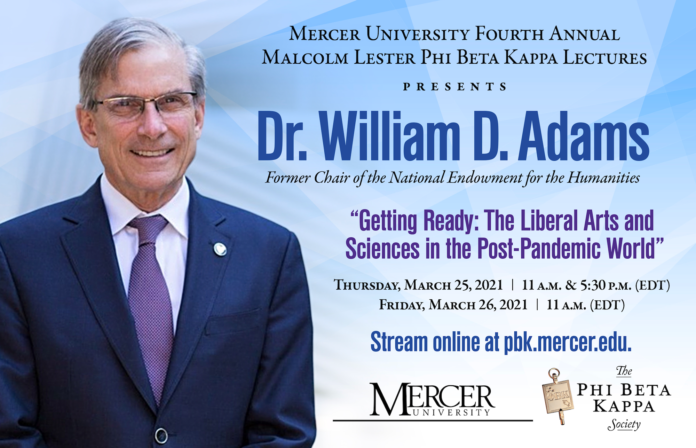MACON – The Phi Beta Kappa Society’s Zeta Chapter of Georgia at Mercer University will host the fourth annual Malcolm Lester Phi Beta Kappa Lectures on Liberal Arts and Public Life this spring.
Dr. William D. Adams, former chair of the National Endowment for the Humanities (NEH), will present three lectures on the theme “Getting Ready: The Liberal Arts and Sciences in the Post-Pandemic World” March 25-26. The lectures will be livestreamed at pbk.mercer.edu.
“The events of the past year will have a long-term impact on the United States. In these lectures, Dr. Adams assesses the impact and offers a vision of liberal learning that prepares students to meet new challenges and opportunities,” said Dr. David A. Davis, president of Mercer’s chapter of Phi Beta Kappa and editor of the Lester Lecture Series.
Dr. Adams’ opening lecture is titled “Work Readiness” and will take place March 25 at 11 a.m. It will be followed by “Participation Readiness” March 25 at 5:30 p.m. and “Meaning Readiness” March 26 at 11 a.m.
“Undergraduate students in the United States will soon inherit a world vastly changed by the COVID-19 pandemic,” said Dr. Adams. “What form of higher education is best suited to the challenges they will encounter? These lectures will make the case for the unique power and relevance of the liberal arts and sciences in meeting the needs of our current circumstances. Only the liberal arts and sciences are capable of equipping our students with the forms of knowledge, understanding and concern that the world now requires.”
Dr. Adams served as the 10th chair of NEH from 2014-2017. In that capacity, he initiated several new grantmaking programs under the banner of “The Common Good: The Humanities in the Public Square.” After leaving NEH, he was named a Senior Fellow at the Andrew W. Mellon Foundation, where he continued his national advocacy on behalf of the humanities.
Dr. Adams previously served as president of Colby College from 2000-2014, president of Bucknell University from 1995-2000 and vice president and secretary of Wesleyan University from 1989-1995. He taught political philosophy at the University of North Carolina, Chapel Hill, and at Santa Clara University. He also coordinated the Great Works in Western Culture Program at Stanford University.
He earned his Ph.D. in the History of Consciousness Program at the University of California, Santa Cruz, and his B.A. in philosophy from Colorado College. He is currently working on a book about the French phenomenologist Maurice Merleau-Ponty and the painter Paul Cézanne.
Mercer’s Malcolm Lester Phi Beta Kappa Lectures are supported by a bequest from the late Dr. Malcolm Lester, a 1945 graduate of the University and former dean of the College of Liberal Arts.
In 2007, Dr. Lester made a gift for a lecture series on the liberal arts at Mercer once the University sheltered a chapter of the Phi Beta Kappa Society, the nation’s most prestigious academic honor society, which it did in 2016. Additionally, the lectures will be published by the University of Virginia Press, as requested by Dr. Lester, who earned his Ph.D. from U.Va.
About the College of Liberal Arts and Sciences
Mercer University’s College of Liberal Arts and Sciences serves as the academic cornerstone of one of America’s oldest and most distinctive institutions of higher learning. The oldest and largest of Mercer’s 12 schools and colleges, it is a diverse and vibrant community, enrolling more than 1,900 students, dedicated to learning and service through the practice of intellectual curiosity, respectful dialogue and responsible citizenry. The College of Liberal Arts and Sciences offers majors in more than 30 areas of study, including more than a dozen pre-professional academic tracks, with classes taught by an outstanding faculty of scholars. In 2015, Mercer was awarded a chapter of The Phi Beta Kappa Society, the nation’s most prestigious academic honor society that recognizes exceptional achievement in the arts and sciences. For more information, visit liberalarts.mercer.edu.










